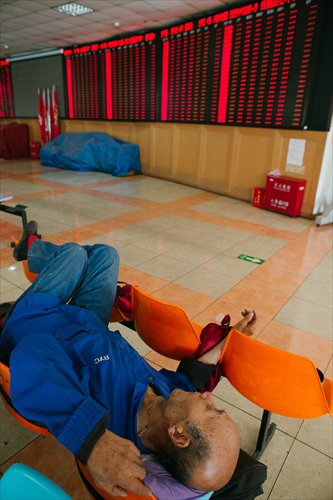HOME >> METRO BEIJING
Stock market anxiety syndrome
By Chen Ximeng Source:Global Times Published: 2015-7-14 20:43:01

Doctors say investors should be wary of stock market anxiety syndrome, a series of mental and physical ailments that occur with the ups and downs in the stock market . Photo: Li Hao/GT
After Frank Feng, a 26-year-old financial reporter in Beijing started investing in the stock market, he discovered he had almost changed into another person. Before he entered the bull market as a new investor, he was very dedicated to work and liked to socialize with people, but now he has become extremely moody and is almost on the verge of a nervous breakdown.When the bull market turned bear, he began to fail to control his temper and sometimes would become furious, suddenly letting out screams for no reason.
And when the bear market continued, depression came. "When stocks suddenly fell with all the indexes turning green, it easily scared me," Feng said. "For several days after the fall happened, I was so depressed and regretful that I did not want to do anything or say one word."
Feng said he simply wanted to make "a little" money in April when China's stock market was doing well, but he suffered a crushing defeat because of the stock market crash last month. Feng lost around 60,000 yuan ($9,666), half of his investment, which is almost all of his savings.
China's stock market has gone through several rises and slumps in recent months, which has taken investors for a roller coaster ride up and down from euphoria to profound sadness. The phenomenon has been recently garnering so much attention that people have begun to give it a name - "stock market anxiety syndrome" - which describes the physical sufferings of insomnia and anorexia and mental issues of anxiety, nervousness, and irritability that stock market investors may experience.
A 2014 study by National Taipei University, titled, "Do stock prices drive people crazy?" the first of its kind to examine the potential relation between stock market volatility and mental disorders, found a clear relationship between fluctuation in stock prices and the number of people hospitalized for psychological conditions. The study found that a 1 percent fall in the Taiwan Stock Exchange Capitalization Weighted Stock Index (TAIEX) in one single day increases the number of people hospitalized with a mental disorder each day by 0.36 percent, and a 1000-point fall in the TAIEX increased the daily hospitalizations for mental disorders by 4.71 percent.
Xia Weiping, a psychologist who works at Xin Hua Hospital at Shanghai Jiao Tong University School of Medicine, said he had seen far more patients this year due to stock market volatility compared to last year, and some of them are even suicidal.
"Investors face a higher risk of anxiety and depression than non-investors. This is because by investing in the stock market, they face the possibility of great losses and gains directly affecting their fate," said Xia.
But for Feng, he felt depressed not only when the stocks fell, but also when the stocks climbed or rebounded. Even if it was a bull market, he was still very anxious and could not sleep well at night.
"On the one hand, I hope that the rise can continue, but at the same time I am afraid it is just a sweet dream which will suddenly end and the nightmare crash will come again," said Feng.
Xia said there are also cases where investors are so ecstatic that they have a sudden rise of blood pressure, which is very dangerous for those with hypertension or coronary heart disease.
Xia said people who are "emotionally unstable and easily influenced by their external environment" are more at risk to be affected by stock market anxiety syndrome.
According to Xia, to stay both mentally and physically healthy, investors should have a full grasp of their own financial situation, and not be too greedy - in other words, avoid having daydreams about making a large fortune overnight.
Posted in: Intel